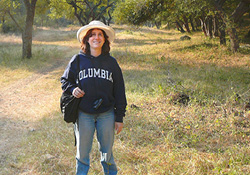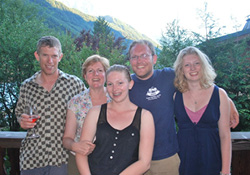By Mark Fefer
If there was one magazine article that every woman working in the legal profession surely read last year, it was Anne-Marie Slaughter’s piece in The Atlantic, entitled “Why Women Still Can’t Have It All.” The article argued that our culture and economy together make it nearly impossible for women to enjoy a satisfying family life and achieve high levels of professional success.
The article spawned conversation around the country, including at DWT, where a luncheon meeting was convened at the Seattle office to discuss the issues the magazine raised.
Among the numerous ideas advanced by Ms. Slaughter was that attempting to build a new career at a mature age—perhaps after raising children—was a losing proposition for women. That assertion came as news to two DWT associates, both of whom graduated law school late in life, and have built successful careers at the firm.
 “If your credentials are good, people are going to be interested,” says Camille Calman, a mid-level associate in our New York office, who is turning 50 this year.
“If your credentials are good, people are going to be interested,” says Camille Calman, a mid-level associate in our New York office, who is turning 50 this year.
Calman spent the early part of her adult life working in the arts and then TV news—and she’s glad she did. “At age 21, it’s easy to say ‘Who needs money?’” she laughs. She served as a theatrical stage manager, and then, “when it became clear I couldn’t afford a new pair of sneakers,” she moved into television. She ended up being a segment producer at the business news cable network CNBC.
But she eventually saw no upward trajectory that seemed fun or interesting. “I looked around at my bosses and they weren’t making TV anymore,” she says. “They were supervising and going to meetings.” Seeking out a new field, she says, “I started to think about what skills I had, and had been using, and where they might take me.”
The law struck her as a perfect fit. “Writing a TV interview is not so different from writing a deposition,” she says. “Stage-managing a play and trying to figure out all the things that can go wrong is not that different from preparing for trial. The things I’m good at are the things lawyers need to do.”
She was accepted to Columbia Law School and was the oldest person in her class upon entering in 2003. But nowhere did she find that her age presented an obstacle. Quite the contrary.
“I did well and was the executive managing editor of the law review,” she says. “When applying for summer associate jobs, I got more interviews than friends who were younger. Employers didn’t look at me and say, ‘Boy, we’d rather have a 24-year-old who would stay up all night.’ What I had was something younger associates don’t have: experience in the workplace. I wasn’t going to put my foot in my mouth in front of clients. Some of the firms did a lot of copyright work, which related to my previous careers.”
Calman spent five years with a large New York firm after graduating, and put in plenty of long hours—which, she notes, would have been more challenging for someone with small children. “Nobody treated me differently because I was old,” she says.
In May 2011, she returned to DWT’s New York office, where she’d had “a wonderful time” as a summer associate. She now practices with the firm’s nationally renowned media and First Amendment group as a litigator, and co-edits the group’s award-winning newsletter MediaLaw Monitor.

When Joanne van Erp Montague, an associate and patent attorney in our Seattle office, graduated from Seattle University Law School she was 49—and had been out of the full-time workforce for 20 years. But she too found a way to capitalize on her earlier work and education and parlay it into a successful legal career.
With a bachelor’s degree in electrical engineering from Stanford, Montague had gotten her start working at Delco Electronics, a division of GM, on navigational computers for aircraft. Along the way, GM paid for her to get an M.B.A., which she acquired from the Wharton School.
But in 1989, with a 3-year-old in tow, Montague and her husband, Dave, moved to Seattle, where she decided to be at home for a while. “I thought I’d last six months,” she says. “But it turned into 17 years and two more children. It was just the best situation for our growing family. To have the option was a great luxury.”
Eventually, with the first of her kids off to college, and the others becoming more self-sufficient, Montague needed a plan for what to do next. She began working with her husband on the business side of their new software consulting company. She also began to think about pursuing another degree, one that would provide her new direction while making use of her past experience. Intellectual property law seemed like the perfect fit.
Entering Seattle U’s law school—which is well known for the diversity of its student body—Montague knew, she says, that “I had to niche myself pretty early on. I wouldn’t have a lot of years to dabble in things.” She took the patent bar between her first and second years. And she went to work for an IP boutique firm after graduating summa cum laude.
“I never felt that being older was a detriment to my job search,” she says. “My technical background and record at school outweighed any concerns there.”
Montague adds that “going into any job with a lot of life experience is really beneficial. I’ve seen so many organizations and had so many different positions—including volunteer positions—that it makes it easier to figure out how to work within any system.”
She came to Davis Wright in 2010, when a partner she was working closely with joined the firm. These days she focuses on licensing transactions of all sorts, with particular experience in standard-setting organizations and open source software.
Law, she says, “was a really great choice. You can step into a career where there’s a lot of responsibility and it’s intellectually challenging.”
Having the right partner at home was also essential, she says. “My husband did everything while I was in law school and he still helps out a lot. What I really like is that I’m a role model for my kids. Not just saying you can do anything you want at any time, but showing it.”
